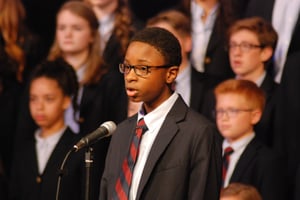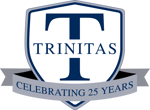 Every once in a while at Trinitas a student will ask, “Why do we do that anyway?” and it reminds me that we don’t always do a thorough job of communicating to students why we do the things we do. If the student also says something like, “My friend who goes to [fill in the blank] school doesn’t do that,” then it becomes clear that we are not talking enough to our students about the methods to our madness. There is more going on at Trinitas than reading, writing, and arithmetic.
Every once in a while at Trinitas a student will ask, “Why do we do that anyway?” and it reminds me that we don’t always do a thorough job of communicating to students why we do the things we do. If the student also says something like, “My friend who goes to [fill in the blank] school doesn’t do that,” then it becomes clear that we are not talking enough to our students about the methods to our madness. There is more going on at Trinitas than reading, writing, and arithmetic.
One topic that frequently generates such questions is music. Trinitas students take music classes from kindergarten until tenth grade as part of the core curriculum. We desire every Trinitas student to graduate with the ability to read music and to sing the music they read with a reasonable level of proficiency. All Trinitas students from 4th through 12th grades are also part of one of our three choirs that practice throughout the year. Why would we put our students through all that music? Because music is an important part of their education, and not just any music either, but a hefty dose of classical music. In fact, we find music so important that we take students out of their regular classes each week for their private music lessons—this year, seventy-three Trinitas students are taking private lessons from one or more of our five music teachers. That is a lot of students in a small school like Trinitas.
There is an oft used Latin phrase in classical education: ad fontes, which means by extension to the source. In literature and history and language we take students back to the original sources of knowledge. We educate from primary sources where possible instead of filtering through textbooks. If you can know what the original text says, why would you settle for a version filtered through someone else’s opinion? In music, too, we want our students learning from the classical composers so that they are building a solid musical foundation with original building blocks. Simple music and electronic shortcuts are everywhere, but the student with a solid foundation will understand music and be able to recognize and appreciate beauty in music, and maybe eventually create original music as well.
Yes, we do music a little differently at Trinitas than the way they may do it in many other schools, but that’s because we have a different musical goal for our graduates than other schools might have. There is a method to our madness. For a good summary of the classical approach to music, a summary that both parents and students may find helpful, check out this Basecamp Live podcast.


